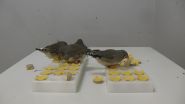(Press-News.org) Highly-social zebra finches learn foraging skills from their parents. However, new research has found that when juvenile finches are exposed to elevated stress hormones just after hatching, they will later switch strategies and learn only from unrelated adult birds - ignoring their parents' way of doing things and instead gaining foraging skills from the wider network of other adult finches.
Researchers say that spikes in stress during early development may act as a cue that their parents are doing something wrong, triggering the young birds to switch their social learning strategy and disregard parental approaches in favour of acquiring skills exclusively from other birds in the flock.
This stress cue and subsequent behavioural change would then allow the juveniles to bypass a "potentially maladaptive source of information" - possibly the result of low-quality parental investment or food scarcity at birth - and consequently avoid a "bad start in life", say the researchers.
The changes this stress could create in the patterns of individuals' social interactions may impact important population-wide processes, such as migration efficiency and the establishment of animal culture, they say. The new study is published today in the journal Current Biology.
"These results support the theory that developmental stress may be used as an informative cue about an individual's environment. If so, it may enable juveniles to avoid becoming trapped in a negative feedback loop provided by a bad start in life - by programming them to adopt alternative, and potentially more adaptive, behaviours that change their developmental trajectories," said Dr Neeltje Boogert, from Cambridge University's Department of Zoology, who authored the study with colleagues from the universities of Oxford and St Andrews.
For the study, the research team took 13 broods of zebra finch hatchlings and fed half of the chicks in each brood with physiologically relevant levels of the stress hormone corticosterone dissolved in peanut oil, and the other half - their control siblings - with just plain peanut oil. The chicks were treated each day for 16 days from the ages of 12 days old.
Once the chicks reached nutritional independence, they were released with their families into one of two free-flying aviaries, where researchers tracked their social foraging networks using radio tags called PIT tags (Passive Integrated Transponder), about the size of a grain of rice. Each bird's unique PIT tag was scanned when a bird visited a feeder, allowing the researchers to track exactly who was foraging where, when and with whom.
Using these feeder visit data, the researchers were able to build finch social foraging networks, as the thirteen zebra finch families in the two aviaries foraged and interacted over the course of 40 days.
They found that the juveniles administered with the stress hormone were less likely to spend time with their parents, spent more time with other unrelated birds and were far less choosy about which birds they foraged with; whereas the control group stuck more closely to their parents, and foraged more consistently with the same flock mates.
To test whether these stress-hormone induced differences in social network positions affected who learned from whom, Boogert devised a food puzzle for the birds, and recorded exactly when each bird started solving it.
In the new test, the birds had to learn to flip the lids from the top of a grid of holes to reach the food reward of spinach underneath. All other feeders were removed from the aviaries, and the researchers filmed a series of nine one-hour trials over three days, monitoring and scoring how each bird learned to get to the bait.
They found that, while the control group of juvenile finches did also learn from some unrelated adults, they mostly copied their parents to find out how to get the spinach. In sharp contrast, the developmentally-stressed chicks exclusively copied unrelated adults instead - not one looked to a parent to figure out the key to the spinach puzzle.
In fact, the stressed juveniles actually solved the task sooner than their control siblings, despite not using parents as role models to focus on. Boogert says this may be because they relied more on trial-and-error learning, or that they simply had access to the information sooner because they copied a large number of unrelated adult finches rather than just one of their two parents.
"If developmentally stressed birds occupy more central network positions and follow many others around, this might make them especially efficient spreaders of disease, as stressed individuals are also likely to have weakened immune systems," said Boogert.
"The next step is to explore the implications of our results for important population-level processes, such as the spread of avian pox or flu."
INFORMATION:
If you find yourself downing that extra piece of chocolate fudge cake even though you're not hungry, it might be the absence of a hormone in your brain that's causing you to overeat purely for pleasure.
In a new Rutgers Robert Wood Johnson Medical School study published in Cell Reports, researchers found that when the hormone glucagon like peptide-1 (GLP-1) was reduced in the central nervous system of laboratory mice, they overate and consumed more high fat food.
"The mice in which the GLP-1 deficiency was induced ate beyond the need for calories and showed an increase ...
A new study by researchers at University of California, San Diego School of Medicine reveals a protein's critical - and previously unknown -- role in the development and progression of acute myeloid leukemia (AML), a fast-growing and extremely difficult-to-treat blood cancer.
The finding offers a novel target for better treating AML, and possibly other cancers, by cutting off the ability of tumors to access nearby cellular players that feed its growth. The study was published July 23 in Cell Stem Cell.
"The work really focuses on trying to understand the dependence ...
Alexandria, VA - EARTH Magazine takes you to Le Mans, France, to cover how the World Endurance Competition (WEC) race series is transforming automotive efficiency in both high-performance racing and the commercial automotive industries. EARTH's latest feature explores the science behind efficiency upgrades used by three major racing competitors: Porsche, Audi and Toyota.
Using physics and cutting-edge materials results in a "fascinating case study of how unbridled competition can produce unique, innovative and extraordinary solutions to engineering barriers once thought ...
CHAPEL HILL, NC (July 23, 2015) - For years, a crisis has been brewing in molecular biology. The problem is that antibodies--research tools used to identify key proteins at work in a cell--aren't always what they seem. Unreliable antibodies have led to numerous instances of false findings, failed experiments, and wasted money and samples.
Enter the Histone Antibody Specificity Database, a newly launched online portal that lets scientists find the right antibodies for their research with a much higher degree of confidence than ever before. Rather than relying on the claims ...
It's well known that being socially connected promotes a person's overall and psychological health. A new study from the University of Rochester now shows that the quantity of social interactions a person has at 20--and the quality of social relationships that person has at age 30--can benefit her well-being later in life.
People with poor social connections have been shown to be at an increased risk for early mortality. "In fact," said lead author Cheryl Carmichael, who conducted the research as a PhD candidate in psychology at the University of Rochester, "having ...
Astronomers using the Karl G. Jansky Very Large Array (VLA) have discovered jets of material ejected by still-forming young brown dwarfs. The discovery is the first direct evidence that brown dwarfs, intermediate in mass between stars and planets, are produced by a scaled-down version of the same process that produces stars.
The astronomers studied a sample of still-forming brown dwarfs in a star-forming region some 450 light-years from Earth in the constellation Taurus, and found that four of them have the type of jets emitted by more-massive stars during their formation. ...
Chemotherapy for patients with end-stage cancer was associated with worse quality of life near death for patients with a good ability to still perform many life functions, according to an article published online by JAMA Oncology.
Physicians have voiced concerns about the benefits of chemotherapy for patients with cancer who are nearing death. An American Society of Clinical Oncology (ASCO) expert panel has called chemotherapy use among patients for whom there was no evidence of clinical value the most widespread, wasteful and unnecessary practice in oncology.
Holly ...
PHILADELPHIA - Physicians in training are twice as likely to order a costly brand-name statin (used to lower blood cholesterol levels) when supervised by senior physicians who prefer those medications in their own practice, according to a new study led by researchers at the Perelman School of Medicine at the University of Pennsylvania and published online in the Journal of General Internal Medicine. These findings document a link between low-value prescribing and graduate medical training, which physicians undergo after completing medical school but before they can practice ...
If oxygen was a driver of the early evolution of animals, only a slight bump in oxygen levels facilitated it, according to a multi-institutional research team that includes a Virginia Tech geoscientist.
The discovery, published Wednesday in the journal Nature, calls into question the long held theory that a dramatic change in oxygen levels might have been responsible for the appearance of complicated life forms like whales, sharks, and squids evolving from less complicated life forms, such as microorganisms, algae, and sponges.
The researchers discovered oxygen levels ...
JACKSONVILLE, Fla. -- In their bid to find the best combination of therapies to treat anaplastic thyroid cancer (ATC), researchers on Mayo Clinic's Florida campus demonstrated that all histone deacetylase (HDAC) inhibitors are not created equal.
In testing multiple HDAC inhibitors in combination with the chemotherapy drug paclitaxel, known to give some benefit for this aggressive cancer, they found that class II HDAC inhibitors signal through a newly discovered pathway to promote synergy with chemotherapy treatment.
They say their study, published online today in Endocrine ...

